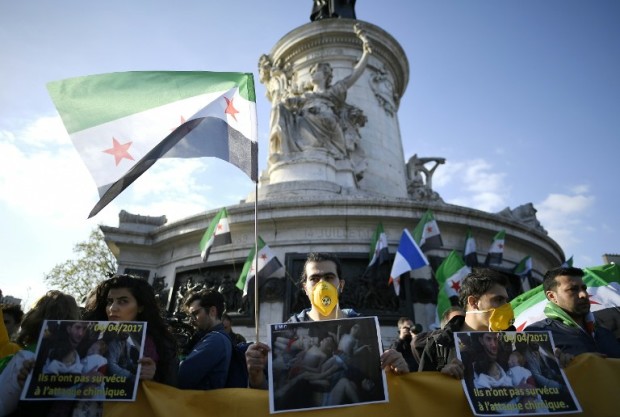US threatens military response to Syria ‘chemical’ attack

Protesters hold pictures and Syria’s former independence flags (which have been adopted by the rebels forces fighting against Syrian pro-government forces in Syria) during a demonstration to protest against chemical attacks in Syria on April 6, 2017, on the Place de la Republique, in Paris, two days after a suspected chemical attack in the northwestern province of Idlib. AFP
PALM BEACH, United States — The United States Thursday threatened Syria with military action as President Donald Trump warned “something should happen” following a suspected chemical attack that left at least 86 dead and provoked global outrage.
An American decision to strike the regime in Damascus could hinge on the outcome of a Security Council vote, at around 2300 GMT, on a Western resolution on the attack that could face a Russian veto.
US Secretary of State Rex Tillerson vowed an “appropriate response” to the attack in Khan Sheikhun in rebel-held Idlib province, whose victims included 27 children.
READ: Chemical attack kills dozens in Syria, US blames Assad
Trump has signaled a startling about-turn towards President Bashar al-Assad, who many in the international community hold responsible for Tuesday’s horrific events.
Article continues after this advertisement“What Assad did is terrible. What happened in Syria is truly one of the egregious crimes,” the US leader said Thursday. “I guess he’s running things, so I guess something should happen.”
Article continues after this advertisementTrump’s comments came as Tillerson — who like him was in Florida to welcome China’s Xi Jinping — called explicitly for “a political process that would lead to Assad leaving” and said his future role in the country was “uncertain.”
It remained unclear whether Assad’s main ally Russia would resort to its veto power to block the draft resolution presented to the UN, which was slightly revised following negotiations over the past two days.
Britain, France and the United States are backing the draft which demands a full investigation of the incident, which Turkey believes exposed victims to the nerve agent sarin.
The US Ambassador Nikki Haley has warned that Washington could take unilateral action if the world body fails to respond to the serious allegations of chemical weapons use.
A US official said the Pentagon is presenting the White House with a range of possible military options, including cruise missile or air strikes on Assad’s air fields in a bid to ground his air force — but that no decisions had been taken.
Any such military action brings enormous risks, as strikes could be subject to skirting Russian air defenses. Moscow also has advisors on the ground in Syria.
Syrian denial
Trump on Wednesday decried the suspected attack as an “affront to humanity,” seemingly horrified by photographs showing dead children and victims suffering convulsions, breathing problems and foaming at the mouth.
Results from post-mortems performed on victims point to possible exposure to sarin, according to Turkish health officials.
“It crossed a lot of lines for me,” Trump said, alluding to Barack Obama’s failure to enforce his own “red line” on the use of chemical weapons in Syria four years ago.
In 2013, Trump had urged then-president Obama not to intervene against Assad.
After six years of grueling civil war, the sudden specter of US military action against Assad and calls for his removal mark a dramatic shift in policy.
Just last week, UN envoy Haley condemned Assad’s history of abuses but said Washington should work with powers like Turkey and Russia to seek a political settlement, rather than focusing on the Syrian leader.
Syrian Foreign Minister Walid Muallem on Thursday repeated the regime’s denial it conducted a chemical strike.
“The Syrian army has not, did not and will not use this kind of weapons — not just against our own people, but even against the terrorists that attack our civilians with their mortar rounds,” he said.
Russia also stood by its longtime ally, with President Vladimir Putin warning against a rush to judgment.
Putin underlined “the unacceptability of making unfounded accusations against anyone before a thorough and impartial international investigation is carried out.”
‘Terrible responsibility’
The UN children’s agency UNICEF says at least 546 people were wounded in the suspected chemical attack.
More than 30 people were transferred across the border into Turkey for treatment, and Ankara said a preliminary probe found a link between these injuries and sarin.
If confirmed to be a chemical attack, this would be among the worst such incidents in Syria’s civil war, which has killed more than 320,000 people since it began in March 2011.
The draft UN resolution backs a probe by the Organization for the Prohibition of Chemical Weapons and demands Syria provide information on its operations.
The OPCW said Thursday it has opened an “ongoing investigation” and has “initiated contact with the Syrian authorities.”
Russia has previously used its veto seven times to shield Syria at the UN.
France warned Moscow it would face a “terrible responsibility in front of history” if it did so once more.
Syria officially relinquished its chemical arsenal and signed the Chemical Weapons Convention in 2013 to avert military action after it was accused of an attack outside Damascus that killed hundreds.
But there have been repeated allegations of chemical weapons use since. CBB